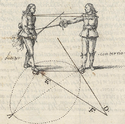|
|
You are not currently logged in. Are you accessing the unsecure (http) portal? Click here to switch to the secure portal. |
Difference between revisions of "Pablo de Paredes"
| Line 143: | Line 143: | ||
{{sourcebox | {{sourcebox | ||
| work = Translation | | work = Translation | ||
| − | | authors = [[Eric Myers]] | + | | authors = [[translator::Eric Myers]] |
| source link = | | source link = | ||
| source title= | | source title= | ||
Revision as of 18:57, 21 February 2022
| Pablo de Paredes | |
|---|---|
| Born | date of birth unknown |
| Died | after 1599 |
| Occupation | Fencing master |
| Movement | Esgrima común |
| Language | Spanish |
Pablo de Paredes (Paulo de Paredes) was a late 16th century Spanish fencing master. Little is known of this master's life, but he seems to have been the Head Master of Arms (Maestro Mayor) to the royal court of Spain in 1599. There he instructed Jehan L'Hermite, a Belgian and one of the prince's tutors, in the use of the montante and double side swords. The only known record of Paredes' teachings is a passage in L'Hermite's memoir, which records twelve rules for the montante but indicates that he had forgotten the double sword teachings.
Contents
Treatise
Transcription |
||
|---|---|---|
Rules or Canons of the Two-Handed Sword:
|
Regles ou Canons de l’espée à deux mains. La primera, es de un tajo, y una estocada, entrando y saliendo. |
Regeln oder Vorschriften des Schwertes zu zwei Hand: Die erste lautet Ein Tajo, und ein Stich, zutretend und abtretend. |
|
2a Dos tajos, y una estocada y un revez, entrando y saliendo. |
2. Zwei Tajos, und ein Stich und ein Revez, zutretend und abtretend. |
|
3a Dos tajos, entrando, y dos revezes saliendo. |
3. Zwei Tajos, zutretend, und zwei Revezes abtretend. |
|
4a Tres vueltas de tres tajos entrando, y tres revezes saliendo. |
4. Drei Wendungen von drei Tajos zutretend, und drei Revezes abtretend. |
|
5c Estocada y tajo entrando y estocada y revez saliendo. |
5. Stich und Tajo zutretend und Stich und Reves abtretend. |
|
6a Dos tajos y una estocada vuelta por las espaldas, y un revez entrando y saliendo. |
6. Zwei Tajos und ein Stich hinterrücks gewendet, und ein Revez zutretend und abtretend. |
|
7a Tres cenidos entrando la vuelta con tajo y otros tres saliendo, y la vuelta un revez, es para hazer plaça. |
7. Drei umschlingende zutretend, die Wendung mit Tajo und weitere drei abtretend, und die Wendung ein Revez, dies ist um Platz zu machen. |
|
8a Tres tajos y una estocada y un revez, y vueltas las espaldas salir de la misma manera, es para una calleja angosta. |
8. Drei Tajos und ein Stich und ein Revez, und hinterrücks gewendet trete ab auf die gleiche Art und Weise, dies ist für eine schmale Gasse. |
|
9a Un tajo y una estocada, entrando, y saliendo, es la guarda cappa. |
9. Ein Tajo und ein Stich, zutretend, und abtretend, dies ist der Schutz des Mantels. |
|
10a Un tajo cegando, y otro cayendo, y una estocada y con su revez, entrando y saliendo. Es para una plaça redonda. |
10. Ein versperrender (Anm .d. Übersetzers: Cegando = Versperren, Blenden, zumauern.) Tajo, und ein anderer niederfallend, und ein Stich und mit deinem Revez, zutreten und abtreten. Dies ist für einen runden Platz. |
|
11a Dos tajos un passo tras otro metiendo el pie yzquierdo primero y volver con estocada y revez, es la Bregua que llaman. |
11. Zwei Tajos einen Schritt nach dem anderen den linken Fuß zuerst setzend und wenden mit Stich und Revez, dies nennt man die Bregua (Anm .d. Übersetzers: Bregua: Bedeutung unklar. Evtl. von brega=Streit, oder tregua=Kampfpause). |
|
12c Estocada con saccar el pie yzquierdo y un tajo a pie quedo, y otra sacando el derecho con un revez a pie quedo, ylas vueltas con revez meneando los pies, es para une calle ancha. |
12. Stich mit Ziehen des linken Fußes und ein Tajo mit stillstehenden Fuß, und ein weiterer unter einem Ziehen des Rechten mit einem Revez mit stillstehendem Fuß, und die Wendung mit Revez mit einem hin und her Bewegen der Füße, dies ist für eine breite Straße. |
For further information, including transcription and translation notes, see the discussion page.
| Work | Author(s) | Source | License |
|---|---|---|---|
| Translation | Eric Myers | ||
| Transcription | Charles Ruelens | Le Passetemps de Jehan L'Hermite |
Additional Resources
- L'Hermite, Jehan. Le Passetemps de Jehan L'Hermite. Antwerp: J. E. Buschmann, 1896.
References
- ↑ A Talho is a forehand blow.
- ↑ A Revez is a backhand blow.
- ↑ Vuelta could be a turn of the sword or the body, depending on context.
- ↑ Cenido is probably analogous to the Portuguese cingido. I translated cingindo as circling in the Memorial, but there is likely more to it than that. Cegando is probably "sawing", meaning slicing not chopping (Capoferro uses this term as well), but it could also mean "blinding". Figueiredo doesn't give us enough info to clearly define it. I like firm-footed too, but in several traditions that term is used to describe a lunge, meaning that one foot is firm instead of both moving. That's my only reason for using "standing still".
|
|||||||||||||||||||||||||||

